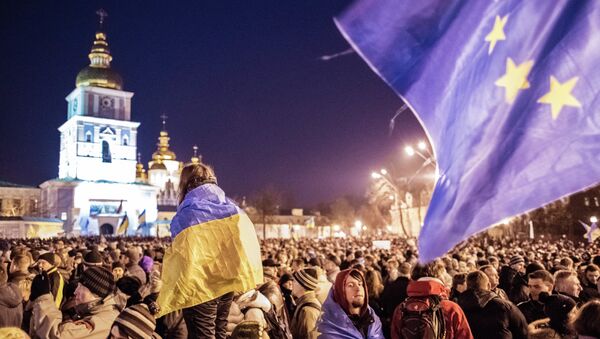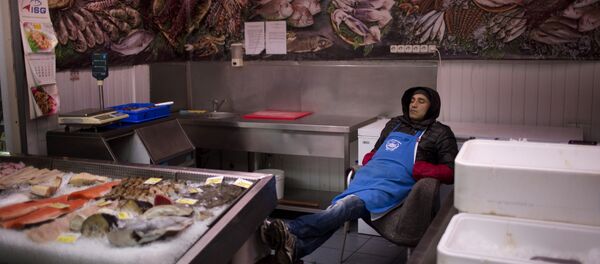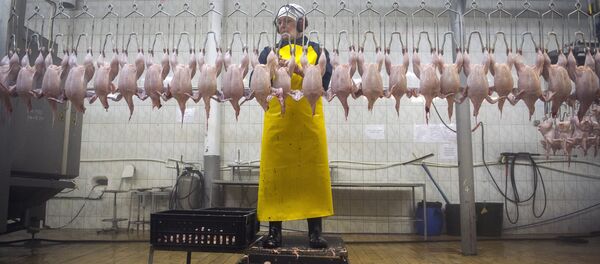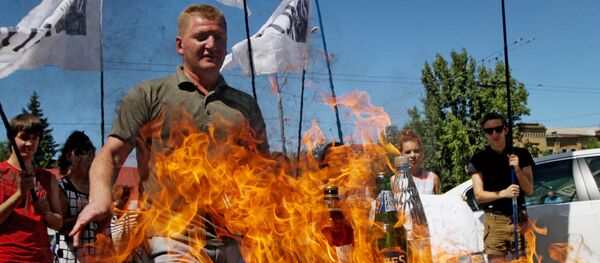According to Brussels' figures, in the first year of association, Georgia managed to increase its exports to the EU by 15%, with Moldova doing even better, increasing exports by a whopping 62%. Accordingly, lawmakers noted that "they expect similar growth" from Ukraine.
Unfortunately, as Svobodnaya Pressa columnist Maria Bezchastnaya pointed out in a recent piece, such demands defy the economic realities faced by Kiev. In fact, 2015 saw Ukraine's exports to the EU decline by 30-35%, following on a trend which started in 2014.
"After the quotas were filled, it became necessary to pay the tariff. Many quotas were reached within 2-3 months; in 2016, the quota for corn (400 tons) was reached by January 6, that is, in only one week's time."
"This situation," Bezchastnaya recalls, "has disappointed even many fervent supporters of European integration among Ukraine's business community."
The journalist pointed to Ukrainian agricultural magnate Yuriy Kosyuk's recent explosive interview for Voice of America's Ukrainian service, where the former Petro Poroshenko advisor suggested that the EU's free trade agreement with Ukraine has turned out to be a "defrauding of Ukraine."
"Europe talks of the Free Trade Area with Ukraine, and at the same time a load of exceptions and limitations are put on the export of Ukrainian goods. Because of this, the free trade area is only one-way, into Ukraine," the tycoon said, speaking to the US government broadcaster.
Commenting on the businessman's grumblings, Serhiy Arbuzov, the former deputy prime minister under the Yanukovych government, ousted by the Euromaidan coup d'état in early 2014, noted that his government had warned about the poor prospects for EU-Ukraine trade integration back in 2013, "but at that time, these same businessmen, fascinated by the mythical 'European perspective', did not want to listen."
Now, Bezchastnaya writes, Ukraine's business elite now understands that Russia's warning during the tripartite talks with the EU [in 2014] "was not merely 'Kremlin propaganda', but the truth." The question today, she says, is whether this will affect Kiev's political course, and the heretofore "inviolable policy of European integration."
Speaking to Svobodnaya Pressa, prominent Ukrainian political analyst Viktor Pirozhenko suggested that "Kosyuk's comments amount to a diagnosis, for himself and the Kiev regime as a whole. There is no basis for expecting Ukraine's exports to the EU, ranging from agricultural products to industrial goods with a decent added value, to grow. We cannot even speak about restoring the comfortable positions of years past, for example, in the area of semi-finished metal products."
"The Kosyuk interview reveals the complete and utter lack of understanding of EU trade policy and Ukraine's real economic capabilities. The country will not be able, in the short or in the long term, to expand its export of agricultural products to the EU. The goods which Europe needs, for instance –bananas, coconuts and so on, are not produced by Ukraine. Everything else is already produced in large quantities and is of better quality inside the EU itself."
Ultimately, the analyst laments, "everything that Kosyuk said was the absolute truth. The only problem is that we knew this in 1995, and in 2004, after the first coup in Ukraine, and in 2013."
"If Ukrainian exports in 2015 did grow, they grew in the direction of the Asian markets, something Kiev does not even aspire to. That's the whole paradox and irony of European integration. But the worst thing is that these Asian exports have not managed to cover even one percent of the losses caused by the termination of exports to Russia and the markets of the Eurasian Economic Union."
"The loss of the Russian market," Pirozhenko said, "factually amounts to a conscious rejection of exporting manufactured goods, and a rejection of technological chains with Russian enterprises, which had previously allowed for the production of goods with a high added value, and their export to third countries. Europe has no need for such products; they simply do not have a market."
As for the European parliament's advice to Kiev that Ukraine should 'be more like Moldova and Georgia' in increasing its exports to the EU, the analyst explained that the advice is pure folly, given that the scale our Ukraine's economy is not comparable with those of Moldova and Georgia. "Ukraine's economic potential, even in its current, grave condition, exceeds that of Moldova, Georgia, Bulgaria and Romania combined."
In its own time, the analyst recalled, the Yanukovych/Azarov government had no plans to sign the association agreement, despite threatening to do so. "Virtually all respected Ukrainian political experts at the time warned of the risks at various talks and round tables. The biggest mystery," in the expert's view, "is why entrepreneurs like Kosyuk, —intelligent people who managed to build up their businesses, did not listen to or understand what was said."
"I have only one hypothesis," Pirozhenko noted: "that business, the new government, and Brussels, apparently, considered only one option: that Russia would agree to keep Ukraine in the CIS free trade zone, and thus pay for all the risks associated with European goods making their way to Russia via Ukraine. If this is the case, it demonstrates the extent of the degradation of Ukrainian and European expert thought."
Kiev authorities' plans, Pirozhenko suggests, "consist of selling anti-Russian policy to the West, and to make a living off it. That is their main export." These "are people who do not associate their future with Ukraine. Their financial security is assured by the West. They are, in every sense of the word, puppets who do not decide anything."
For his part, Bodgan Bezpalko, the deputy director of Ukrainian and Belarusian Studies at Moscow State University, told the newspaper that in his estimation, "the Association Agreement provides only for Ukraine's colonial status, where Brussels, and specifically, Germany, play the role of the colonial masters. Today, after the agreement came into force, some Ukrainian businessmen have suddenly discovered things which had been obvious to economists two years ago."
"Of course," the analyst noted, "it is possible for Ukraine, Moldova, and Georgia to increase their exports to the EU. The big question is about the nature of these exports. The agreement provides for the signatory countries to export raw materials to the European Union, and to open their markets for European goods of high added value in return."
Echoing his fellow expert's analysis that the current leadership is unable to admit its mistakes and to change course, Bezpalko suggests that the country's elite "will not give up on European integration under any circumstances. Firstly, doing so would lead to the questions: What about all the victims? Why was Yanukovych's regime overthrown? Why do we tolerate 44% inflation, a sharp decline in living standards and the collapse of our currency? So far, all of this has been tolerated for the sake of one day becoming part of Europe, even in a truncated form. If the government suddenly recognizes that this ideology, this cult, has led to a complete fiasco, what is these authorities reason for being?"
"Ukraine's elite is not independent. It is dependent on the West. If the West decides to change its position toward Ukraine, or the vector of its development, it will simply change one representative of the elite for another. And they will implement the new policy. But no one has any plans to change or dismiss the current government, despite its failures across the board, and so they will continue to implement the course which was previously committed to."







